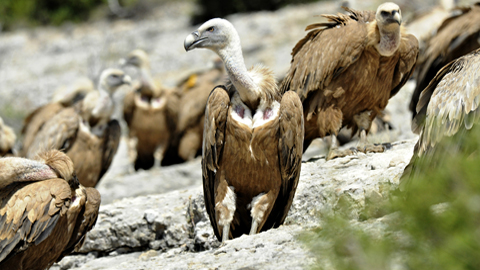The UAB to study the presence of diclofenac in carrion birds

07/03/2017
Carrion birds, and especially certain types of vultures, are extremely sensitive to the toxic effects of nonsteriodal anti-inflammatory drugs such as diclofenac, which they can accidentally ingest from the corpses of domestic animals treated with these products.
The study which now begins will last three years and its objective is to study the presence of residue and toxicity of these drugs in Iberian carrion birds and detect their possible presence in domestic animal carcasses used in controlled feeding points. In addition, a risk analysis will be conducted with the data obtained from the analysis and information gathered from surveys with veterinarians and people in charge of the feeding points for carrion birds, in order to assess the use of these drugs and the effects they can have on the Iberian population.
“In the 1990s, diclofenac caused a catastrophic mortality among vulture populations of the Indian subcontinent due to the consumption of livestock treated with this drug. It is calculated that a mere 0.8% of livestock carcasses containing diclofenac residue alone could have caused this massive mortality, resulting in the death of over 40 million vultures, which represents approximately 99% of the population, and threatening several species with extinction. In 2013, the conservationist and scientific communities were dismayed to discover that diclofenac was licensed for veterinary use in some European countries, including Spain. This situation represents a horrible risk for the conservation of carrion birds, especially in the Iberian Peninsula, where 95% of Europe's vulture population lives”, Ignasi Marco explains.
The results obtained in this project will provide key information to veterinary authorities regulating the use of these drugs, which already have been prohibited in several Asian countries since 2006, and will serve for future decision-making processes.
The Morris Animal Foundation was founded in Denver, Colorado, and is a nonprofit organization that invests in science to advance animal health, including that of wild animals. The project which received support from the foundation will be conducted by a team from different institutions - Universitat Autònoma de Barcelona, Institute for Research into Cinegetic Resources, University of Lleida and University of Aveiro - as well as the Raptor Center of the University of Minnesota.